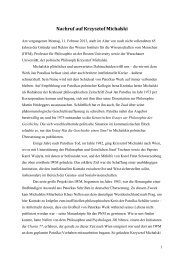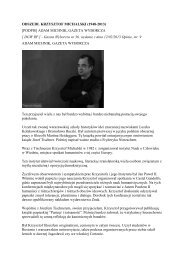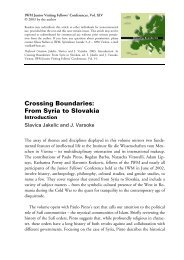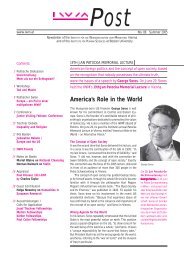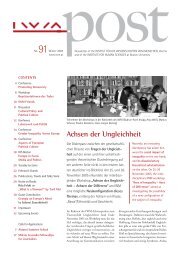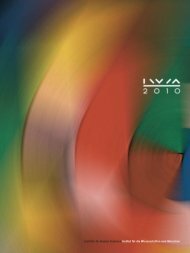Questionable Returns: Introduction - IWM
Questionable Returns: Introduction - IWM
Questionable Returns: Introduction - IWM
You also want an ePaper? Increase the reach of your titles
YUMPU automatically turns print PDFs into web optimized ePapers that Google loves.
<strong>IWM</strong> Junior Visiting Fellows Conferences, Vol. XII<br />
© 2002 by the author<br />
Readers may redistribute this article to other individuals for noncommercial use,<br />
provided that the text and this note remain intact. This article may not be reprinted<br />
or redistributed for commercial use without prior written permission from<br />
the author. If you have any questions about permissions, please contact Klaus Nellen<br />
at <strong>IWM</strong>, Spittelauer Laende 3, A – 1090 Vienna, e-mail .<br />
Preferred Citation: Bove, Andrew. 2002. <strong>Introduction</strong>. In <strong>Questionable</strong> <strong>Returns</strong>,<br />
ed. A. Bove, Vienna: <strong>IWM</strong> Junior Visiting Fellows Conferences, Vol. 12.<br />
<strong>Introduction</strong><br />
Andrew Bove<br />
The following articles are fruits of a half-year visit to the Institut für die Wissenschaften<br />
vom Menschen by ten young scholars from nine countries who work in a<br />
wide range of fields. This diversity explains the lack of any very specific theme or<br />
topic. Taken as a whole, the journal is better suited to a social sciences polymath<br />
than to any academic specialist. Under one set of (virtual) covers one reads about<br />
the Russian Orthodox Church’s struggle with modernity, Hannah Arendt’s Socrates,<br />
social transformation in South Africa, and post-structuralist historiography,<br />
among many other things.<br />
Most of the articles were presented at the Junior Fellows Conference at the <strong>IWM</strong><br />
in June 2001, and all are extracts or versions of larger projects undertaken during<br />
residency there from January through June 2001. During our stay in Vienna we<br />
Junior Fellows held a regular seminar consisting of work-in-progress presentations<br />
and the discussions and exchanges they provoked. The seminar provided us the opportunity<br />
to explain our work to an audience at once diverse and highly competent.<br />
It was an invaluable opportunity for young scholars to test their ability to step away<br />
from the modes and orders of their academic provinces and make a cosmopolitan<br />
case for the importance of their research. The seminar was supplemented by frequent<br />
informal conversation at meals and elsewhere. We all benefited from what<br />
seemed at times a constant effort at translation – linguistic, but more often and<br />
more importantly, intellectual and conceptual – undertaken less out of necessity
ANDREW BOVE: INTRODUCTION 2<br />
than a wish to communicate matters important to us to those whom we came to<br />
know and like.<br />
The articles represent the <strong>IWM</strong>’s Schwerpunkte or fields of concentration. Essays<br />
on Arendt, Lefort, and Hegel belong to 19 th and 20 th Century Political Philosophy;<br />
papers on Czech liberalism, Ukrainian language politics, and the Russian Orthodox<br />
Church pertain to Political and Social Transformation in Central and Eastern<br />
Europe; a disquisition on historiography since Saussure goes to the heart of theoretical<br />
debates on European Contemporary History; and a rich polemic against universalist<br />
prejudices in feminist theory represents Gender Studies. Diverse as these<br />
fields are, they reflect not an eclectic institution but one committed to organized<br />
inquiry into the diverse totality of the human things, a commitment that in our<br />
times necessitates a difficult passage between the Scylla of methodological monism<br />
and the Charybdis of aestheticist fragmentation. A few well-chosen fields with important<br />
connections to major contemporary historical and intellectual currents<br />
seems a wise and moderate course.<br />
Collectively the ten articles constitute an examination of the human sciences as<br />
well as their common object, the human. They do so in response to the questions<br />
raised by modernity’s constant transformations. These questions call not only for<br />
continual adaptation and innovation in the study of human affairs, but also for attention<br />
to past forms that continue to structure modern life and thought and have<br />
not been put to rest by any historical development or progress, or notion thereof. In<br />
this connection, we begin to discern a unifying theme after all. The theme is that of<br />
return – or rather returns – to categories and entities that have been obscured or disrupted<br />
by social and political change, but whose deep roots in human experience<br />
and self-understanding ensure their survival and nourish the possibility of their reemergence.<br />
Most of the articles deal with a return of some kind, though we hasten<br />
to add that they do not so much attempt or demand returns as consider ones that<br />
are already underway. Return is less the tendency than the subject matter – but neither<br />
is it the case that the authors are simply suspicious or admonitory towards the<br />
returns which they address. Most begin with pragmatic observations about the inevitability<br />
or worth of some category or entity, and then ask how it may be recovered<br />
or restored in a reasonable way. A brief review of the articles will help clarify<br />
their common theme as well as introduce their diverse subject matter.
ANDREW BOVE: INTRODUCTION 3<br />
The journal is organized into five parts, each of which consists of a pair of articles<br />
on related themes or topics. Part one contains papers on two very definite political<br />
transformations in Central and Eastern Europe. Michal Kopecek discusses, from<br />
the Czech standpoint, the rise and fall of the so-called Visegrád cooperation<br />
amongst four Central European states. He traces the origins of the debate – which<br />
began in earnest in the 1980s with the publication of a seminal essay by Milan<br />
Kundera – over whether Central Europe constitutes a discrete civilization. Kopecek’s<br />
objects are the idea of a “return to Europe” which animated Czech politics in<br />
the years following the Velvet Revolution and the political debates surrounding this<br />
idea. Recounting the “row of the two Václavs” that was of crucial importance in the<br />
reconstitution of Czech politics after 1989, he shows how the “realism” of Klaus<br />
came to prevail over the “idealism” of Havel, and why in the Czech Republic the<br />
so-called return to Europe has been much more a matter of pragmatic negotiation<br />
than recovery of a buried identity.<br />
Tatiana Zhurzhenko’s topic is language politics in contemporary Ukraine, specifically,<br />
debates over the status of the Ukrainian and Russian languages in the new<br />
state. She gives a brief political-linguistic history of Ukraine from the 19 th Century<br />
to the present, followed by a discussion of the dynamics of Ukrainian’s return as an<br />
official state language. Utilizing both empirical data and recent theory on the rights<br />
of linguistic minorities, Zhurzhenko argues that the task of Ukrainian nationbuilding<br />
today calls for a moderate multicultural approach to “the language issue,”<br />
one guided by prudence and political justice and not linguistic or ethnic revanchism.<br />
Kopecek and Zhurzhenko teach us much about how the revolutions in the<br />
East call for careful balancing of past and future.<br />
In part two, Inna Naletova and Julia Huang discuss two distinct religious<br />
movements. Using recent sociological data, Naletova analyzes the status and influence<br />
of the Orthodox Church in contemporary Russia. Her main question is<br />
whether or not a Church revival is underway, and she thinks the evidence suggests<br />
an affirmative answer. But this presents a problem, for post-Communist Russia is a<br />
modern country where a simple return to the pre-revolutionary bond between<br />
church and state is highly unlikely or impossible. On the other hand, Naletova suggests<br />
that the Church might play a valuable role in Russia’s future by helping restore<br />
civic purpose and checking the libertarian excesses of Western liberalism and<br />
capitalism. In any case, the Church seems fated to endure alongside liberalism in<br />
future Russian society, and Naletova makes a strong case for the importance of<br />
practical reflection and systematic research on the relation between the two.
ANDREW BOVE: INTRODUCTION 4<br />
Huang, an anthropologist, deals with a phenomenon not so much of religious return<br />
as religious expansion and adaptation. Her topic is the extraordinarily successful<br />
Buddhist Compassionate Relief Society, a Taiwanese non-governmental organization<br />
that has spread around the globe and become one of the world’s largest<br />
charitable organizations in its 35 years of existence. Her intriguing question, “What<br />
Travels?”, supplies the framework for a study of the relation between religious charisma<br />
and charitable relief in a global society. Huang’s account of the organization<br />
and its founder explores with great clarity connections between traditional Buddhist<br />
notions of compassion and modern humanitarian ideals.<br />
The third “questionable return” is that of the notion of culture, the topic of articles<br />
by Jyoti Mistry and Andrew Bove. Mistry’s paper is a case study of the South<br />
African contribution to the 2000 Millennium Global Television Broadcast. She<br />
discusses how traditional images of South African culture – village life, dancing, the<br />
natural beauty of the land, etc. – were employed to the political end of integrating<br />
the new South African nation into a quite different global culture based on commerce.<br />
The broadcast centered on Robben Island, the site of Nelson Mandela’s imprisonment,<br />
and Mandela’s symbolic passing of the flame to current President<br />
Thabo Mbeki literally stole the show, since the broadcast’s international producers<br />
had expressly prohibited political content. Mistry’s account of the event shows the<br />
difficulty, and perhaps the futility, of attempting to fix a border between indigenous<br />
culture and the demands of present day international politics and economics.<br />
Bove considers the use of the notion of culture in modern empirical political science.<br />
He argues that there are serious problems with the way culture has been incorporated<br />
into certain models of political explanation. These problems point to a<br />
more general tension between politics and culture in both the theory and the practice<br />
of the modern state, for which the dualism between a low-brow modern politics<br />
of individual satisfaction and the cultural critique of modern politics is a constant<br />
source of instability. Bove argues that recent attempts to bring culture to politics<br />
ultimately point the way back to Hegel and his radical reconception of Bildung<br />
as an immanent process of self-completing division within the modern state. We<br />
are given a fresh perspective on what is often inaccurately regarded as Hegel’s attachment<br />
to a fustian or even totalitarian educational ideal.<br />
The methodological and epistemological emphasis of Bove’s article carries over<br />
into part four, consisting of two papers concerned in quite different ways with the<br />
restoration of universality in the human sciences. Alessandro Barberi, a historiogra-
ANDREW BOVE: INTRODUCTION 5<br />
pher, asks why the science of history has only recently opened itself to the insights<br />
of the other human sciences, even though the latter became thoroughly historicized<br />
during the nineteenth century. He seeks to use this belated “opening” not to divide<br />
and compartmentalize the study of history, but on the contrary to revive the notion<br />
of histoire generale in a way consistent with the historicistic insights of the past two<br />
centuries. It is an ambitious project, and Barberi takes us through one stage of it: a<br />
reconstruction of the history of media that builds on the linguistic insights of Saussure.<br />
Sociologist Veronika Wittmann provides a provocative “analysis against the homogenization<br />
of feminist theory and practice in the context of the so-called First<br />
and Third Worlds.” Beginning with an analysis of power relations between European<br />
and non-European nations, she proceeds to show how these relations have distorted<br />
the approaches of “First World” feminists to their “Third World” counterparts<br />
– an opposition Wittmann calls into question. She shows how race prejudices<br />
and the “naturalization” of cultural differences have yielded falsely universalistic<br />
feminist claims, and calls for critical reflection on the role of socioeconomic inequality<br />
between Europe and non-Europe, North and South, white and black in<br />
feminist discourse. To begin with, Wittmann suggests that feminists pay greater attention<br />
to the actual life circumstances of women outside Europe and North America.<br />
The last two papers deal variously with the status of the political in philosophic<br />
thought about human life. In her modestly titled “comment,” Meike Schmidt-<br />
Gleim tarries with the question of whether class struggle plays any necessary role in<br />
the democratic theory of Claude Lefort, or whether for him it is just another contingency<br />
in the open and indeterminate space of contemporary democracy. Drawing<br />
on linguistic and psychoanalytic theory, Schmidt-Gleim attempts to recover the<br />
importance of class struggle in a way consistent with a thoroughly contingent understanding<br />
of modern democracy. Proper attention to the “symbolic” and the<br />
“imaginary” as well as the “real” reveals the originary but nevertheless decentered<br />
role of class struggle. In the background is Lefort’s own move away from Marxism<br />
towards a more general and reformist conception of democratic politics, and for<br />
this reason the paper makes an important contribution to our understanding of the<br />
course of the French Left in the decades since 1968.<br />
In the last article, Kamila Kulik discusses Hannah Arendt’s civic interpretation of<br />
the Socratic daimon, and makes a case for its importance in Arendt’s attempt to<br />
elaborate an authentic political dimension within modern life. Kulik links Arendt’s
ANDREW BOVE: INTRODUCTION 6<br />
conception of the citizen with her more general notion of political judgment by<br />
calling attention to the doubleness or “two-in-one” of the human being and his or<br />
her daimon. To think is to be in constant dialogue with oneself – not, however, an<br />
internal contemplative dialogue, but an external practical or public dialogue with<br />
one’s constant but unseen companion, one’s daimon. This dialogical or intersubjective<br />
character of thought, developed through constant practice, generates the specifically<br />
practical judgment proper to politics – such according to Arendt is what we<br />
learn from the example of Socrates.<br />
Finally, it is the returns of certain ideas and forms of social life that are in question,<br />
not the returns on the time we spent in Vienna, and for this reason thanks<br />
and acknowledgements are in order. We thank the <strong>IWM</strong> for the invitation to spend<br />
six productive months in Vienna and for the many kindnesses extended to us<br />
throughout our stay. We specially thank Janos Kovacs for his direction of the Junior<br />
Visiting Fellows Seminar. His patient attention and penetrating questions (often<br />
posed at the very end when we thought we were in the clear) were an example of a<br />
rare generosity of intellect. Thanks to the discussants at the Junior Fellows Conference<br />
for their time and effort, which were of great benefit to us, and Michal Kopecek,<br />
Katharina Coudenhove-Kalergi, Susanne Fröschl, Maria Nicklas, and Anita<br />
Traninger for organizing the conference. Thanks also to Klaus Nellen for overseeing<br />
the production of the journal, and to David Soucek for the electronic work and<br />
for his great and generous expertise in all matters technical throughout our stay.<br />
The editor personally wishes to thank all the Junior Visiting Fellows and the members<br />
of the <strong>IWM</strong> publications staff for their patience and assistance while this volume<br />
was being prepared.
ANDREW BOVE: INTRODUCTION 7<br />
Authors’ Biographical Information<br />
ALLESANDRO BARBERI<br />
Doktorand der Geschichtswissenschaften, Stipendiat im Rahmen des<br />
Doktorandenprogramms der Österreichischen Akademie der Wissenschaften;<br />
Lektor am Institut für Wirtschafts- und Sozialgeschichte der Universität<br />
Wien.<br />
ANDREW BOVE<br />
Ph.D. Candidate in Political Science, Boston College; currently Visiting Lecturer<br />
in Government, Wesleyan University.<br />
CHIEN-YU JULIA HUANG<br />
Ph.D. in Anthropology, Boston University, May 2001; currently postdoctoral<br />
research fellow at Harvard University.<br />
MICHAL KOPECEK<br />
Ph.D. Candidate in International Relations, Charles University, Prague; currently<br />
researcher at the Institute for Contemporary History, Czech Academy<br />
of Sciences, Prague.<br />
KAMILA KULIK<br />
Ph.D. Candidate at the Graduate School for Social Research, Institute of Philosophy<br />
and Sociology of the Polish Academy of Sciences.<br />
JYOTI MISTRY<br />
Ph.D. Candidate in Cinema Studies, New York University.<br />
INNA NALETOVA<br />
Ph.D. Candidate at the Department of Religious Studies, Boston University.<br />
MEIKE SCHMIDT-GLEIM<br />
Doktorandin am Institut für Philosophie der Universität Wien; Stipendiatin<br />
im Rahmen des Doktorandenprogramms der Österreichischen Akademie der<br />
Wissenschaften.
ANDREW BOVE: INTRODUCTION 8<br />
VERONIKA WITTMANN<br />
Doktorandin der Soziologie, Universität Linz; Stipendiatin im Rahmen des<br />
Doktorandenprogramms der Österreichischen Akademie der Wissenschaften.<br />
TATIANA ZHURZHENKO<br />
Associate Professor, Department of Philosophy, V. Karazin Kharkhiv National<br />
University, Ukraine.


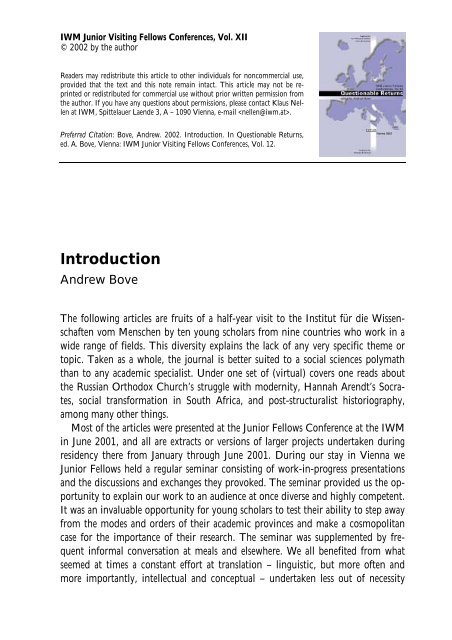
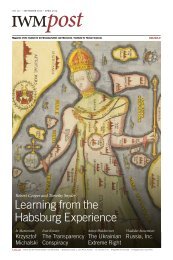
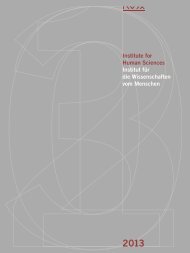
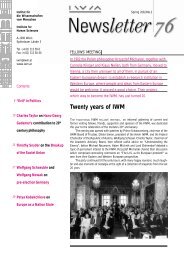
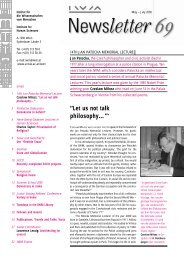
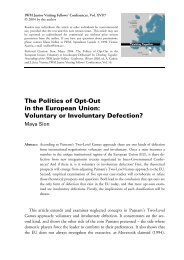
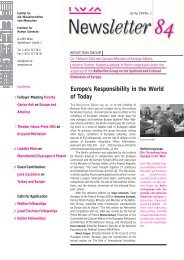
![POSZUKIWAÅ PRAWDY I ZABAWY [PODPIS] PROF ... - IWM](https://img.yumpu.com/23611273/1/184x260/poszukiwaa-prawdy-i-zabawy-podpis-prof-iwm.jpg?quality=85)
